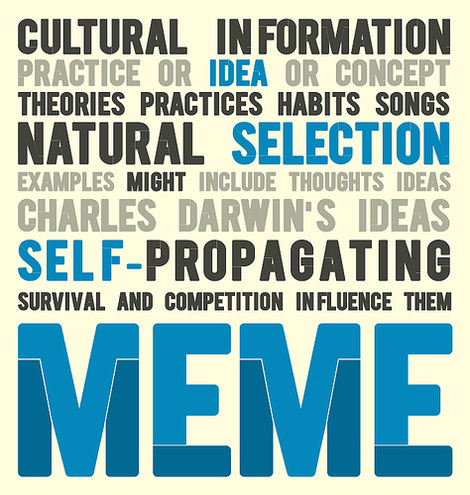
Memes are commonly associated with social communication and learning.
However, socially-learned information coevolves with information acquired within the brain by individual learning. Socially-learned ideas compete with individually-learned ideas for attention and for the same neural real estate. All learned information evolves - not just socially-learned information. The Darwinian basis of individual learning was appreciated by Skinner. The case that learned information evolves along Darwinian lines has been made before - for example by Gary Cziko in Without Miracles.
Social learning depends on the same mechanisms as individual learning to operate. Also, many socially-learned operations incorporate individual learning into their transmission process. For example learning to ride a bicycle is probably about 10% social learning and 90% individual learning.
Cultural evolution may be modelled as a process in which individuals learn from others, combine the results with information they already have, add to it with individual learning, and then pass the results on. Individual learning is a fundamental part of this process.
Ideas inside brains are not represented to treated very differently if they are learned from another individual, or produced locally. For example, if Alice sees Bob using a slip-knot and then reverse-engineers the knot, the resulting knowledge is very similar to if Alice invents the slip-knot by herself.
I think consideration of where the optimal scientific boundaries lie strongly suggests that an evolutionary science of ideas should embrace both social and individual learning. Attempting to place a division between social and individual learning is a dubious way to divide the scientific area - since these two fields are so closely interdependent.
In the past, I've described such ideas in terms of "intercranial memes" and "protomemes".
This post will discuss more radical solutions.
Solutions
One possibility would be to create new terminology to deal with Darwinian approaches to individual learning. Skinner has
already provided us with the term "extinction" - but the terminology of individual learning could be much more thoroughly Darwinised.
Another obvious possibility would be just to expand memetics to include individual learning. Memetics already has some momentum. Cloning it to handle individual learning seems inferior to just expanding memetics to cope with it. That would mean that protomemes became full memes.
This would pleasingly unite Dawkins' "memes" with Semon's "mnemes".
When giving his etymology of the term "meme", Dawkins originally offered the "consolation" that:
it could alternatively be thought of as being related to `memory'
However, a "memory-gene"
only really makes sense if it covers individual learning too.
As I said in my post on meme etymology:
Semon's influence can live on by making memes into "memory-genes" - making use of the "consolation" that Dawkins offered us.
Meme's eye view
If genes are what cells inherit from their parents, memes should be what cultural creatures get from
their parents. However, just as parasites reproduce inside their hosts, memes typically reproduce
inside minds - as well as
between them - and so the parent of a meme may well be another meme inside the
same mind. With this perspective, it seems rather odd to
only consider memes that are descended from memes in the previous generation of hosts. It should be the previous generation of
memes that are under consideration.
Disadvantages
This solution proposed here
does have some disadvantages:
Expanding memetics would conflicts with the 35-year old history of memes and memetics. It would probably divide the memetics community - which could do without such upheavals. It would cause considerable further confusion. Also, the attempt might fail.
Critics would probably delight in some memes retreating further into the human mind - where investigating them empirically would become more difficult. They would also probably delight in some memes getting more tangled together. Already memetics regularly faces the criticism that memes aren't as discrete as they should be if they are to be "like" genes. At the moment memes neatly divide into discrete chunks during environmental transmission - but protomemes being memes would mean that that was no longer true. These criticisms are pretty daft - but memeticists should probably hesitate before willingly providing their critics with ammunition.
The move might also divide memetics from the adademic field of cultural evolution. At the momemnt, it is quite convenient for me to be able to say that memes have scientific validity - since they are almost exactly what Boyd and Richerson defined their "cultural variants" to be in 1985. If memetics expanded, that claim would become inaccurate.
I don't plan to resolve these political disputes here at this stage.
This post exists to point at the field of learning (composed of both social-learning and individual-learning) and to say: that area is what we most urgently need an evolutionary science of - and that area should probably have the best available terminology.
For more about this issue, please see: The case for private culture.
 A possible alternative to having a science of heredity is to have a science of memory and a science of copying (since memory and copying are the main components of heredity). In a number of respects, this would be good - since memory and copying are pretty different phenomena.
A possible alternative to having a science of heredity is to have a science of memory and a science of copying (since memory and copying are the main components of heredity). In a number of respects, this would be good - since memory and copying are pretty different phenomena. Memes are commonly associated with social communication and learning.
Memes are commonly associated with social communication and learning. Most of the criticisms of memetics come from people who don't have a clue what they are talking about.
Most of the criticisms of memetics come from people who don't have a clue what they are talking about. In
In  The term "
The term "








